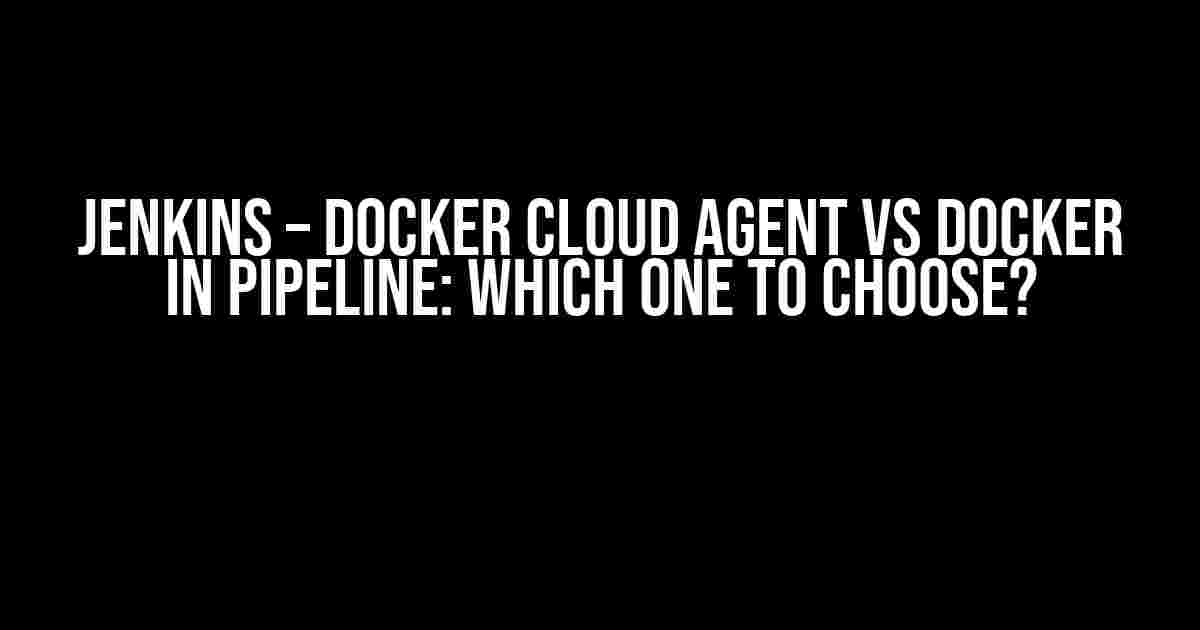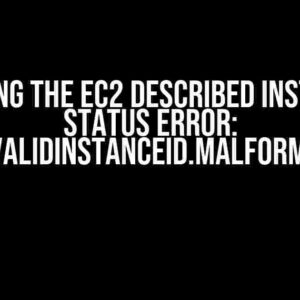Are you trying to decide between using a Docker Cloud Agent and Docker in a pipeline in Jenkins? Look no further! In this article, we’ll dive into the benefits and drawbacks of each approach, helping you make an informed decision for your continuous integration and continuous deployment (CI/CD) pipeline.
- What is a Jenkins Docker Cloud Agent?
- What is Docker in a Jenkins Pipeline?
- Key Differences Between Docker Cloud Agent and Docker in a Pipeline
- When to Choose a Docker Cloud Agent
- When to Choose Docker in a Pipeline
- Example Scenario: Using a Docker Cloud Agent
- Example Scenario: Using Docker in a Pipeline
- Conclusion
What is a Jenkins Docker Cloud Agent?
A Docker Cloud Agent is a cloud-based agent that runs your Jenkins build jobs inside a Docker container. This allows you to scale your Jenkins environment quickly and efficiently, without having to worry about provisioning and managing physical machines or virtual machines.
With a Docker Cloud Agent, you can spin up new agents on-demand, and Jenkins will automatically provision and configure the agent with the required tools and dependencies. This approach provides a high degree of flexibility and scalability, making it ideal for large-scale CI/CD pipelines.
What is Docker in a Jenkins Pipeline?
Docker in a Jenkins pipeline refers to the practice of running Docker containers as part of your pipeline script. This allows you to containerize specific pipeline stages or tasks, such as building and testing your application.
By using Docker in a pipeline, you can isolate specific stages of your pipeline, ensuring that each stage has the required dependencies and tools. This approach provides a high degree of flexibility and control, making it ideal for complex pipeline scripts.
Key Differences Between Docker Cloud Agent and Docker in a Pipeline
Now that we’ve covered the basics, let’s dive into the key differences between using a Docker Cloud Agent and Docker in a pipeline:
| Feature | Docker Cloud Agent | Docker in a Pipeline |
|---|---|---|
| Agent Provisioning | Jenkins provisions and configures the agent | You provision and configure the agent |
| Scalability | Scales horizontally with Jenkins | Scales vertically with pipeline script |
| Flexibility | Limited flexibility in agent configuration | High degree of flexibility in pipeline script |
| Security | Jenkins provides built-in security features | You need to implement security features manually |
| Complexity | Less complex to set up and manage | More complex to set up and manage |
When to Choose a Docker Cloud Agent
Here are some scenarios where a Docker Cloud Agent might be the better choice:
-
You need to scale your Jenkins environment quickly and efficiently.
-
You want to take advantage of Jenkins’ built-in security features.
-
You prefer a more straightforward and easy-to-manage agent setup.
When to Choose Docker in a Pipeline
Here are some scenarios where Docker in a pipeline might be the better choice:
-
You need fine-grained control over specific pipeline stages.
-
You want to isolate specific stages of your pipeline for security or compliance reasons.
-
You prefer a more flexible and customizable pipeline script.
Example Scenario: Using a Docker Cloud Agent
Let’s say you’re building a web application and you want to use a Docker Cloud Agent to run your Jenkins build jobs. Here’s an example of how you might set this up:
pipeline {
agent {
docker {
label 'my-docker-agent'
registryUrl 'https://my-docker-registry.com'
}
}
stages {
stage('Build') {
steps {
sh 'mvn clean package'
}
}
stage('Deploy') {
steps {
sh 'ssh my-deploy-server "mvn deploy"'
}
}
}
}
Example Scenario: Using Docker in a Pipeline
Let’s say you’re building a mobile application and you want to use Docker in a pipeline to run your build and test stages. Here’s an example of how you might set this up:
pipeline {
agent any
stages {
stage('Build') {
steps {
docker.image('my-build-image').inside {
sh 'mvn clean package'
}
}
}
stage('Test') {
steps {
docker.image('my-test-image').inside {
sh 'mvn test'
}
}
}
stage('Deploy') {
steps {
sh 'ssh my-deploy-server "mvn deploy"'
}
}
}
}
Conclusion
In conclusion, both Docker Cloud Agents and Docker in a pipeline have their own strengths and weaknesses. A Docker Cloud Agent provides a scalable and secure solution for running Jenkins build jobs, while Docker in a pipeline provides a flexible and customizable solution for running specific pipeline stages.
Ultimately, the choice between these two approaches will depend on your specific use case and requirements. By understanding the benefits and drawbacks of each approach, you can make an informed decision and choose the best solution for your CI/CD pipeline.
Tips and Tricks
Here are some additional tips and tricks to keep in mind when working with Docker Cloud Agents and Docker in a pipeline:
-
Use Docker Cloud Agents for large-scale CI/CD pipelines.
-
Use Docker in a pipeline for complex pipeline scripts or specific stage isolation.
-
Take advantage of Jenkins’ built-in security features with Docker Cloud Agents.
-
Implement security features manually when using Docker in a pipeline.
Resources
Here are some additional resources to help you get started with Docker Cloud Agents and Docker in a pipeline:
-
Jenkins Docker Cloud Agent documentation: https://jenkins.io/doc/book/docker/#docker-cloud-agents
-
Jenkins Docker Pipeline documentation: https://jenkins.io/doc/book/pipeline/docker/
-
Docker documentation: https://docs.docker.com/
FAQs
Here are some frequently asked questions about Docker Cloud Agents and Docker in a pipeline:
-
Q: Can I use both Docker Cloud Agents and Docker in a pipeline in the same Jenkins instance?
A: Yes, you can use both approaches in the same Jenkins instance, depending on your specific use case and requirements.
-
Q: Do I need to have Docker installed on my Jenkins master node?
A: No, you don’t need to have Docker installed on your Jenkins master node when using a Docker Cloud Agent. However, you will need to have Docker installed on your Jenkins master node when using Docker in a pipeline.
-
Q: Can I use Docker Cloud Agents with other cloud providers?
A: Yes, you can use Docker Cloud Agents with other cloud providers, such as Amazon Web Services (AWS) or Microsoft Azure. However, you will need to configure the cloud provider-specific settings in your Jenkins instance.
By following the guidelines and best practices outlined in this article, you can make an informed decision about which approach to use for your CI/CD pipeline. Happy building!
Frequently Asked Question
Get ready to dive into the world of Jenkins and Docker! Here are the top 5 FAQs about Jenkins – Docker cloud agent vs Docker in pipeline.
Q1: What is the main difference between a Jenkins – Docker cloud agent and Docker in pipeline?
The main difference lies in how Docker is utilized. A Jenkins – Docker cloud agent creates a Docker container as a Jenkins agent, which can be used to execute builds, whereas Docker in pipeline uses Docker as a step within a Jenkins pipeline to create a container, run a command, and then discard the container.
Q2: When should I use a Jenkins – Docker cloud agent?
You should use a Jenkins – Docker cloud agent when you need a consistent and repeatable build environment, and you want to encapsulate your build toolchain within a Docker container. This approach provides a high degree of isolation and reproducibility.
Q3: What are the benefits of using Docker in pipeline?
Using Docker in pipeline provides flexibility, as you can use different Docker images for different stages of your pipeline. This approach also enables you to create a clean and isolated environment for each stage, which can help reduce dependencies and improve overall pipeline reliability.
Q4: Can I use both Jenkins – Docker cloud agent and Docker in pipeline together?
Absolutely! You can use a Jenkins – Docker cloud agent to provide a consistent build environment and then use Docker in pipeline to create additional containers for specific tasks or stages. This hybrid approach can help you leverage the strengths of both methods.
Q5: How do I decide which approach to use for my pipeline?
When deciding between a Jenkins – Docker cloud agent and Docker in pipeline, consider the complexity of your build environment, the requirements of your pipeline, and the level of isolation and reproducibility you need. If you need a high degree of consistency and isolation, a Jenkins – Docker cloud agent might be the better choice. If you need more flexibility and the ability to create multiple containers for different stages, Docker in pipeline could be the way to go.


